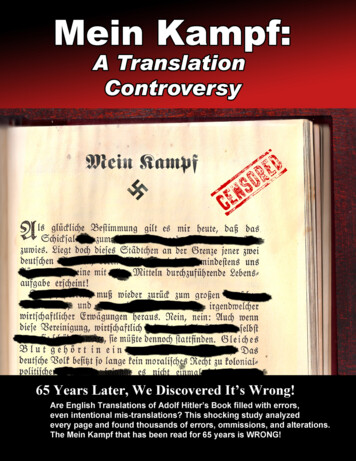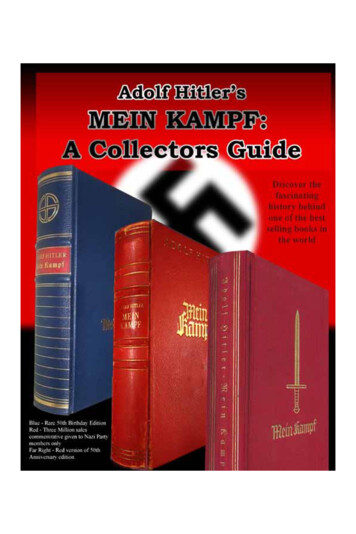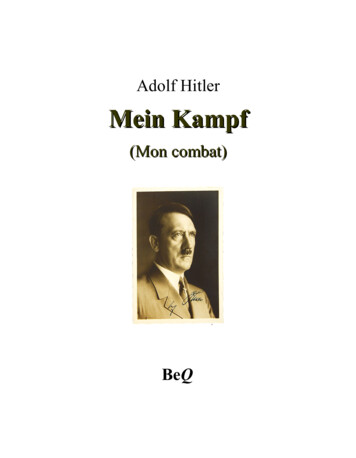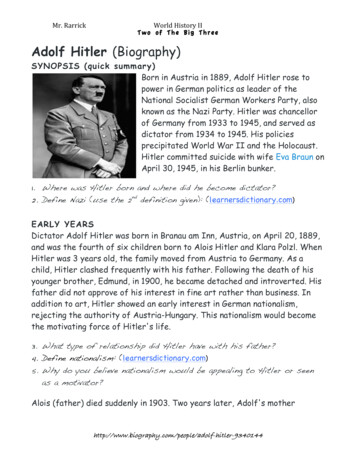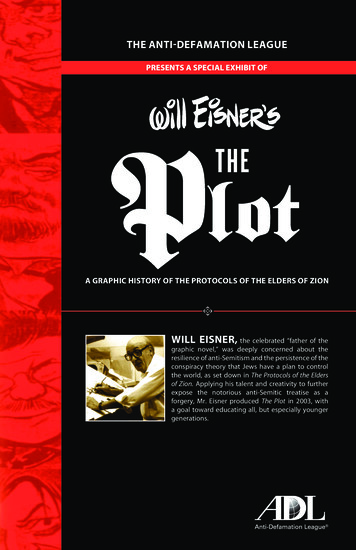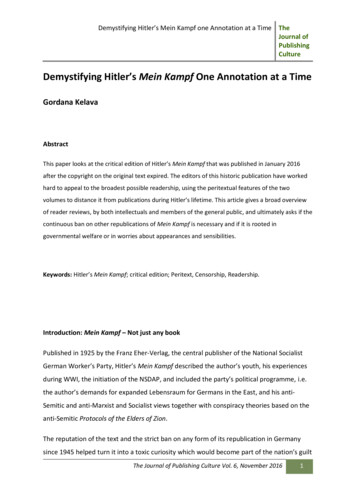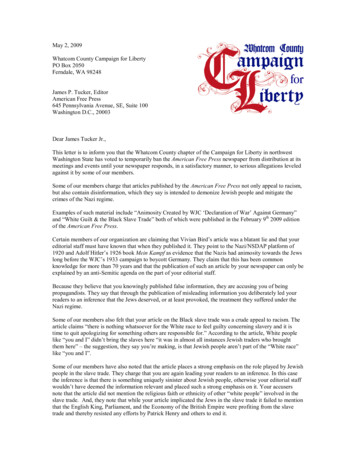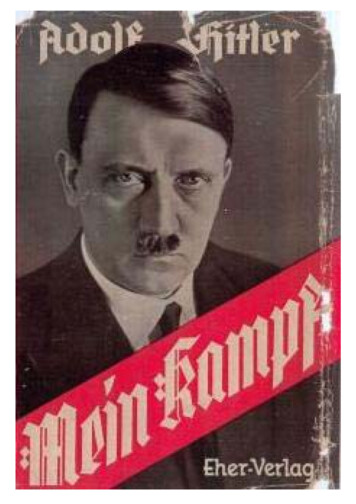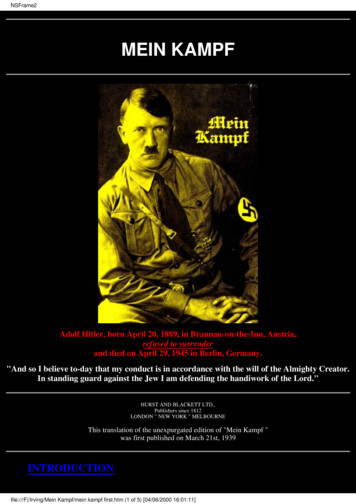
Transcription
NSFrame2MEIN KAMPFAdolf Hitler, born April 20, 1889, in Braunau-on-the-Inn, Austria,refused to surrenderand died on April 29, 1945 in Berlin, Germany."And so I believe to-day that my conduct is in accordance with the will of the Almighty Creator.In standing guard against the Jew I am defending the handiwork of the Lord."HURST AND BLACKETT LTD.,Publishers since 1812LONDON " NEW YORK " MELBOURNEThis translation of the unexpurgated edition of "Mein Kampf "was first published on March 21st, 1939INTRODUCTIONfile:///F /Irving/Mein Kampf/mein kampf first.htm (1 of 5) [04/06/2000 16:01:11]
NSFrame2Volume I: ARETROSPECTCHAPTER I: IN THE HOME OF MY PARENTSCHAPTER II: YEARS OF STUDY AND SUFFERING IN VIENNACHAPTER III: POLITICAL REFLECTIONS ARISING OUT OF MY SOJOURNIN VIENNACHAPTER IV: MUNICHCHAPTER V: THE WORLD WARCHAPTER VI: WAR PROPAGANDACHAPTER VII: THE REVOLUTIONCHAPTER VIII: THE BEGINNING OF MY POLITICAL ACTIVITIESCHAPTER IX: THE GERMAN LABOUR PARTYCHAPTER X: WHY THE SECOND REICH COLLAPSEDCHAPTER XI: RACE AND PEOPLECHAPTER XII: THE FIRST STAGE IN THE DEVELOPMENT OF THEGERMAN NATIONAL SOCIALIST LABOUR PARTYVolume II: THENATIONAL SOCIALIST MOVEMENTCHAPTER I: WELTANSCHHAUUNG AND PARTYCHAPTER II: THE STATECHAPTER III: CITIZENS AND SUBJECTS OF THE STATECHAPTER IV: PERSONALITY AND THE IDEAL OF THE PEOPLES STATECHAPTER V: WELTANSCHHAUUNG AND ORGANIZATIONCHAPTER VI: THE FIRST PERIOD OF OUR STRUGGLECHAPTER VII: THE CONFLICT WITH THE RED FORCESCHAPTER VIII: THE STRONG IS STRONGEST WHEN ALONECHAPTER IX: FUNDAMENTAL IDEAS REGARDING THE NATURE ANDORGANIZATION OF THE STORM TROOPSCHAPTER X: THE MASK OF FEDERALISMCHAPTER XI: PROPAGANDA AND ORGANIZATIONCHAPTER XII: THE PROBLEM OF THE TRADE UNIONSfile:///F /Irving/Mein Kampf/mein kampf first.htm (2 of 5) [04/06/2000 16:01:11]
NSFrame2CHAPTER XIII: THE GERMAN POST-WAR POLICY OF ALLIANCESCHAPTER XIV: GERMANYS POLICY IN EASTERN EUROPECHAPTER XV: THE RIGHT TO SELF-DEFENCEEPILOGUEFoot Notes:1) In order to understand the reference here, and similar references in later portions of Mein Kampf,the following must be borne in mind:From 1792 to 1814 the French Revolutionary Armies overran Germany. In 1800 Bavaria shared in theAustrian defeat at Hohenlinden and the French occupied Munich. In 1805 the Bavarian Elector wasmade King of Bavaria by Napoleon and stipulated to back up Napoleon in all his wars with a force of30,000 men. Thus Bavaria became the absolute vassal of the French. This was The Time of Germanys Deepest Humiliation, Which is referred to again and again by Hitler.In 1806 a pamphlet entitled Germanys Deepest Humiliation was published in South Germany.Amnng those who helped to circulate the pamphlet was the Nürnberg bookseller, Johannes PhilippPalm. He was denounced to the French by a Bavarian police agent. At his trial he refused to disclosethe name of the author. By Napoleons orders, he was shot at Braunau-on-the-Inn on August 26th,1806. A monument erected to him on the site of the execution was one of the first public objects thatmade an impression on Hitler as a little boy.Leo Schlageters case was in many respects parallel to that of Johannes Palm. Schlageter was aGerman theological student who volunteered for service in 1914. He became an artillery officer andwon the Iron Cross of both classes. When the French occupied the Ruhr in 1923 Schlageter helped toorganize the passive resistance on the German side. He and his companions blew up a railway bridgefor the purpose of making the transport of coal to France more difficult.Those who took part in the affair were denounced to the French by a German informer. Schlagetertook the whole responsibility on his own shoulders and was condemned to death, his companionsbeing sentenced to various terms of imprisonment and penal servitude by the French Court. Schlageterrefused to disclose the identity of those who issued the order to blow up the railway bridge and hewould not plead for mercy before a French Court. He was shot by a French firing-squad on May 26th,1923. Severing was at that time German Minister of the Interior. It is said that representations weremade, to him on Schlageters behalf and that he refused to interfere.Schlageter has become the chief martyr of the German resistancc to the French occupation of the Ruhrand also one of the great heroes of the National Socialist Movement. He had joined the Movement at avery early stage, his card of membership bearing the number 61.2) Non-classical secondary school. The Lyceum and Gymnasium were classical or semiclassicalsecondary schools.3) See Translators Introduction.4) When Francis II had laid down his title as Emperor of the Holy Roman Empire of the GermanNation, which he did at the command of Napoleon, the Crown and Mace, as the Imperial Insignia,file:///F /Irving/Mein Kampf/mein kampf first.htm (3 of 5) [04/06/2000 16:01:11]
NSFrame2were kept in Vienna. After the German Empire was refounded, in 1871, under William I, there weremany demands to have the Insignia transferred to Berlin. But these went unheeded. Hitler had thembrought to Germany after the Austrian Anschluss and displayed at Nuremberg during the PartyCongress in September 1938.5) The Phaecians were a legendary people, mentioned in Homers Odyssey. They were supposed tolive on some unknown island in the Eastern Mediterranean, sometimes suggested to be Corcyra, themodern Corfu. They loved good living more than work, and so the name Phaecian has come to be asynonym for parasite.6) Spottgeburt von Dreck und Feuer. This is the epithet that Faust hurls at Mephistopheles as the latterintrudes on the conversation between Faust and Martha in the garden: Mephistopheles: Thou, full ofsensual, super-sensual desire, A girl by the nose is leading thee. Faust: Abortion, thou of filth and fire.7) Herodotus (Book VII, 213218) tells the story of how a Greek traitor, Ephialtes, helped the Persianinvaders at the Battle of Thermopylae (480 B.C.) When the Persian King, Xerxes, had begun todespair of being able to break through the Greek defence, Ephialtes came to him and, on beingpromised a definite payment, told the King of a pathway over the shoulder of the mountain to theGreek end of the Pass. The bargain being clinched, Ephialtes led a detachment of the Persian troopsunder General Hydarnes over the mountain pathway. Thus taken in the rear, the Greek defenders,under Leonidas, King of Sparta, had to fight in two opposite directions within the narrow pass.Terrible slaughter ensued and Leonidas fell in the thick of the fighting.The bravery of Leonidas and the treason of Ephialtes impressed Hitler, as it does almost everyschoolboy. The incident is referred to again in Mein Kampf (Chap. VIII, Vol. I), where Hitlercompares the German troops that fell in France and Flanders to the Greeks at Thermopylae, thetreachery of Ephialtes being suggested as the prototype of the defeatist policy of the Germanpoliticians towards the end of the Great War.8) German Austria was the East Mark on the South and East Prussia was the East Mark on the North.9) Carlyle explains the epithet thus: "First then, let no one from the title Gehoernte (Horned,Behorned), fancy that our brave Siegfried, who was the loveliest as well as the bravest of men, wasactually cornuted, and had horns on his brow, though like Michael Angelos Moses; or even that hisskin, to which the epithet Behorned refers, was hard like a crocodiles, and not softer than the softestshamey, for the truth is, his Hornedness means only an Invulnerability, like that of Achilles&"10) Lines quoted from the Song of the Curassiers in Schillers Wallenstein.11) The Second Infantry Bavarian Regiment, in which Hitler served as a volunteer.12) Schwabing is the artistic quarter in Munich where artists have their studios and litterateurs,especially of the Bohemian class, foregather.13) Here again we have the defenders of Thermopylæ recalled as the prototype of German valour inthe Great War. Hitlers quotation is a German variant of the couplet inscribed on the monumenterected at Thermopylæ to the memory of Leonidas and his Spartan soldiers who fell defending thePass. As given by Herodotus, who claims that he saw the inscription himself, the original text may beliterally translated thus:Go, tell the Spartans, thou who passeth by,That here, obedient to their laws, we lie.file:///F /Irving/Mein Kampf/mein kampf first.htm (4 of 5) [04/06/2000 16:01:11]
NSFrame214)Swedish Chancellor who took over the reins of Government after the death of Gustavus Adolphus15) When Mephistopheles first appears to Faust, in the latters study, Faust inquires: "What is thyname?" To which Mephistopheles replies: "A part of the Power which always wills the Bad andalways works the Good." And when Faust asks him what is meant by this riddle and why he shouldcall himself a part, the gist of Mephistopheles reply is that he is the Spirit of Negation and existsthrough opposition to the positive Truth and Order and Beauty which proceed from the never-endingcreative energy of the Deity. In the Prologue to Faust the Lord declares that mans active nature wouldgrow sluggish in working the good and that therefore he has to be aroused by the Spirit of Opposition.This Spirit wills the Bad, but of itself it can do nothing positive, and by its opposition always worksthe opposite of what it wills.16) The last and most famous of the medieval alchemists. He was born at Basle about the year 1490and died at Salzburg in 1541. He taught that all metals could be transmuted through the action of oneprimary element common to them all. This element he called Alcahest. If it could be found it wouldprove to be at once the philosophers stone, the universal medicine and the irresistible solvent. Thereare many aspects of his teaching which are now looked upon as by no means so fantastic as they wereconsidered in his own time.17) The Battle of Leipzig (1813), where the Germans inflicted an overwhelming defeat on Napoleon,was the decisive event which put an end to the French occupation of Germany.The occupation had lasted about twenty years. After the Great War, and the partial occupation ofGermany once again by French forces, the Germans used to celebrate the anniversary of the Battle ofLeipzig as a symbol of their yearning.18) The flag of the German Empire, founded in 1871, was Black-White-Red. This was discarded in1918 and Black-Red-Gold was chosen as the flag of the German Republic founded at Weimar in1919. The flag designed by Hitler red with a white disc in the centre, bearing the black swastika isnow the national flag.19) After the debacle of 1918 several semi-military associations were formed by demobilized officerswho had fought at the Front. These were semi-clandestine associations and were known as Freikorps(Volunteer corps). Their principal purpose was to act as rallying centres for the old nationalistelements.20) Schiller, who wrote the famous drama of William Tell.21) The reference here is to those who gave information to the Allied Commissions about hiddenstores of arms in Germany.22) Before 1918 Germany was a federal Empire, composed of twenty-five federal states.23) Probably the author has two separate incidents in mind. The first happened in 390 B.C., when, asthe victorious Gauls descended on Rome, the Senators ordered their ivory chairs to be placed in theForum before the Temples of the Gods. There, clad in their robes of state, they awaited the invader,hoping to save the city by sacrificing themselves. This noble gesture failed for the time being; but ithad an inspiring influence on subsequent generations. The second incident, which has more historicalauthenticity, occurred after the Roman defeat at Cannae in 216 B.C. On that occasion Varro, theRoman commander, who, though in great part responsible for the disaster, made an effort to carry onthe struggle, was, on his return to Rome, met by the citizens of all ranks and publicly thanked becausehe had not despaired of the Republic. The consequence was that the Republic refused to make peacewith the victorious Carthagenians.file:///F /Irving/Mein Kampf/mein kampf first.htm (5 of 5) [04/06/2000 16:01:11]
NSFrame2INTRODUCTIONAUTHORS PREFACEOn April 1st, 1924, I began to serve my sentence of detention in the Fortress of Landsberg am Lech,following the verdict of the Munich Peoples Court of that time.After years of uninterrupted labour it was now possible for the first time to begin a work which manyhad asked for and which I myself felt would be profitable for the Movement. So I decided to devotetwo volumes to a description not only of the aims of our Movement but also of its development. Thereis more to be learned from this than from any purely doctrinaire treatise.This has also given me the opportunity of describing my own development in so far as such adescription is necessary to the understanding of the first as well as the second volume and to destroythe legendary fabrications which the Jewish Press have circulated about me.In this work I turn not to strangers but to those followers of the Movement whose hearts belong to itand who wish to study it more profoundly. I know that fewer people are won over by the written wordthan by the spoken word and that every great movement on this earth owes its growth to greatspeakers and not to great writers.Nevertheless, in order to produce more equality and uniformity in the defence of any doctrine, itsfundamental principles must be committed to writing. May these two volumes therefore serve as thebuilding stones which I contribute to the joint work.The Fortress, Landsberg am Lech.At half-past twelve in the afternoon of November 9th, 1923, those whose names are given below fellin front of the Feldherrnhalle and in the forecourt of the former War Ministry in Munich for their loyalfaith in the resurrection of their people:Alfarth, Felix, Merchant, born July 5th, 1901Bauriedl, Andreas, Hatmaker, born May 4th, 1879Casella, Theodor, Bank Official, born August 8th, 1900Ehrlich, Wilhelm, Bank Official, born August 19th, 1894Faust, Martin, Bank Official, born January 27th, 1901Hechenberger, Anton, Locksmith, born September 28th, 1902Koerner, Oskar, Merchant, born January 4th, 1875Kuhn, Karl, Head Waiter, born July 25th, 1897Laforce, Karl, Student of Engineering, born October 28th, 1904Neubauer, Kurt, Waiter, born March 27th, 1899Pape, Claus von, Merchant, born August 16th, 1904file:///F /Irving/Mein Kampf/mein kampf intro.htm (1 of 7) [04/06/2000 16:04:03]
NSFrame2Pfordten, Theodor von der, Councillor to the Superior Provincial Court, born May 14th, 1873Rickmers, Johann, retired Cavalry Captain, born May 7th, 1881Scheubner-Richter, Max Erwin von, Dr. of Engineering, born January 9th, 1884Stransky, Lorenz Ritter von, Engineer, born March 14th, 1899Wolf, Wilhelm, Merchant, born October 19th, 1898So-called national officials refused to allow the dead heroes a common burial. So I dedicate the firstvolume of this work to them as a common memorial, that the memory of those martyrs may be apermanent source of light for the followers of our Movement.The Fortress, Landsberg a/L.,October 16th, 1924TRANSLATORS INTRODUCTIONIn placing before the reader this unabridged translation of Adolf Hitlers book, Mein Kampf, I feel itmy duty to call attention to certain historical facts which must be borne in mind if the reader wouldform a fair judgment of what is written in this extraordinary work.The first volume of Mein Kampf was written while the author was imprisoned in a Bavarian fortress.How did he get there and why? The answer to that question is important, because the book deals withthe events which brought the author into this plight and because he wrote under the emotional stresscaused by the historical happenings of the time. It was the hour of Germanys deepest humiliation,somewhat parallel to that of a little over a century before, when Napoleon had dismembered the oldGerman Empire and French soldiers occupied almost the whole of Germany.In the beginning of 1923 the French invaded Germany, occupied the Ruhr district and seized severalGerman towns in the Rhineland. This was a flagrant breach of international law and was protestedagainst by every section of British political opinion at that time. The Germans could not effectivelydefend themselves, as they had been already disarmed under the provisions of the Versailles Treaty.To make the situation more fraught with disaster for Germany, and therefore more appalling in itsprospect, the French carried on an intensive propaganda for the separation of the Rhineland from theGerman Republic and the establishment of an independent Rhenania. Money was poured out lavishlyto bribe agitators to carry on this work, and some of the most insidious elements of the Germanpopulation became active in the pay of the invader. At the same time a vigorous movement was beingcarried on in Bavaria for the secession of that country and the establishment of an independentCatholic monarchy there, under vassalage to France, as Napoleon had done when he made Maximilianthe first King of Bavaria in 1805.The separatist movement in the Rhineland went so far that some leading German politicians came outin favour of it, suggesting that if the Rhineland were thus ceded it might be possible for the GermanRepublic to strike a bargain with the French in regard to Reparations. But in Bavaria the movementwent even farther. And it was more far-reaching in its implications; for, if an independent Catholicmonarchy could be set up in Bavaria, the next move would have been a union with CatholicGerman-Austria. possibly under a Habsburg King. Thus a Catholic bloc would have been createdwhich would extend from the Rhineland through Bavaria and Austria into the Danube Valley andwould have been at least under the moral and military, if not the full political, hegemony of France.The dream seems fantastic now, but it was considered quite a practical thing in those fantastic times.file:///F /Irving/Mein Kampf/mein kampf intro.htm (2 of 7) [04/06/2000 16:04:03]
NSFrame2The effect of putting such a plan into action would have meant the complete dismemberment ofGermany; and that is what French diplomacy aimed at. Of course such an aim no longer exists. And Ishould not recall what must now seem old, unhappy, far-off things to the modern generation, were itnot that they were very near and actual at the time Mein Kampf was written and were more unhappythen than we can even imagine now.By the autumn of 1923 the separatist movement in Bavaria was on the point of becoming anaccomplished fact. General von Lossow, the Bavarian chief of the Reichswehr no longer took ordersfrom Berlin. The flag of the German Republic was rarely to be seen, Finally, the Bavarian PrimeMinister decided to proclaim an independent Bavaria and its secession from the German Republic.This was to have taken place on the eve of the Fifth Anniversary of the establishment of the GermanRepublic (November 9th, 1918.)Hitler staged a counter-stroke. For several days he had been mobilizing his storm battalions in theneighbourhood of Munich, intending to make a national demonstration and hoping that theReichswehr would stand by him to prevent secession. Ludendorff was with him. And he thought thatthe prestige of the great German Commander in the World War would be sufficient to win theallegiance of the professional army.A meeting had been announced to take place in the Bürgerbräu Keller on the night of November 8th.The Bavarian patriotic societies were gathered there, and the Prime Minister, Dr. von Kahr, started toread his official pronunciamento, which practically amounted to a proclamation of Bavarianindependence and secession from the Republic. While von Kahr was speaking Hitler entered the hall,followed by Ludendorff. And the meeting was broken up.Next day the Nazi battalions took the street for the purpose of making a mass demonstration in favourof national union. They marched in massed formation, led by Hitler and Ludendorff. As they reachedone of the central squares of the city the army opened fire on them. Sixteen of the marchers wereinstantly killed, and two died of their wounds in the local barracks of the Reichswehr. Several otherswere wounded also. Hitler fell on the pavement and broke a collar-bone. Ludendorff marched straightup to the soldiers who were firing from the barricade, but not a man dared draw a trigger on his oldCommander.Hitler was arrested with several of his comrades and imprisoned in the fortress of Landsberg on theRiver Lech. On February 26th, 1924, he was brought to trial before the Volksgericht, or PeoplesCourt in Munich. He was sentenced to detention in a fortress for five years. With several companions,who had been also sentenced to various periods of imprisonment, he returned to Landsberg am Lechand remained there until the 20th of the following December, when he was released. In all he spentabout thirteen months in prison. It was during this period that he wrote the first volume of MeinKampf.If we bear all this in mind we can account for the emotional stress under which Mein Kampf waswritten. Hitler was naturally incensed against the Bavarian government authorities, against thefootling patriotic societies who were pawns in the French game, though often unconsciously so, andof course against the French. That he should write harshly of the French was only natural in thecircumstances. At that time there was no exaggeration whatsoever in calling France the implacableand mortal enemy of Germany. Such language was being used by even the pacifists themselves, notonly in Germany but abroad. And even though the second volume of Mein Kampf was written afterHitlers release from prison and was published after the French had left the Ruhr, the tramp of theinvading armies still echoed in German ears, and the terrible ravages that had been wrought in theindustrial and financial life of Germany, as a consequence of the French invasion, had plunged thefile:///F /Irving/Mein Kampf/mein kampf intro.htm (3 of 7) [04/06/2000 16:04:03]
NSFrame2country into a state of social and economic chaos. In France itself the franc fell to fifty per cent of itsprevious value. Indeed, the whole of Europe had been brought to the brink of ruin, following theFrench invasion of the Ruhr and Rhineland.But, as those things belong to the limbo of a dead past that nobody wishes to have remembered now,it is often asked: Why doesnt Hitler revise Mein Kampf? The answer, as I think, which wouldimmediately come into the mind of an impartial critic is that Mein Kampf is an historical documentwhich bears the imprint of its own time. To revise it would involve taking it out of its historicalcontext. Moreover Hitler has declared that his acts and public statements constitute a partial revisionof his book and are to be taken as such. This refers especially to the statements in Mein Kampfregarding France and those German kinsfolk that have not yet been incorporated in the Reich. Onbehalf of Germany he has definitely acknowledged the German portion of South Tyrol as permanentlybelonging to Italy and, in regard to France, he has again and again declared that no grounds now existfor a conflict of political interests between Germany and France and that Germany has no territorialclaims against France. Finally, I may note here that Hitler has also declared that, as he was only apolitical leader and not yet a statesman in a position of official responsibility, when he wrote thisbook, what he stated in Mein Kampf does not implicate him as Chancellor of the Reich.I now come to some references in the text which are frequently recurring and which may not alwaysbe clear to every reader. For instance, Hitler speaks indiscriminately of the German Reich. Sometimeshe means to refer to the first Reich, or Empire, and sometimes to the German Empire as foundedunder William I in 1871. Incidentally the regime which he inaugurated in 1933 is generally known asthe Third Reich, though this expression is not used in Mein Kampf. Hitler also speaks of the AustrianReich and the East Mark, without always explicitly distinguishing between the Habsburg Empire andAustria proper. If the reader will bear the following historical outline in mind, he will understand thereferences as they occur.The word Reich, which is a German form of the Latin word Regnum, does not mean Kingdom orEmpire or Republic. It is a sort of basic word that may apply to any form of Constitution. Perhaps ourword, Realm, would be the best translation, though the word Empire can be used when the Reich wasactually an Empire. The forerunner of the first German Empire was the Holy Roman Empire whichCharlemagne founded in A.D. 800. Charlemagne was King of the Franks, a group of Germanic tribesthat subsequently became Romanized. In the tenth century Charlemagnes Empire passed into Germanhands when Otto I (936973) became Emperor. As the Holy Roman Empire of the German Nation, itsformal appellation, it continued to exist under German Emperors until Napoleon overran anddismembered Germany during the first decade of the last century. On August 6th, 1806, the lastEmperor, Francis II, formally resigned the German crown. In the following October Napoleon enteredBerlin in triumph, after the Battle of Jena.After the fall of Napoleon a movement set in for the reunion of the German states in one Empire. Butthe first decisive step towards that end was the foundation of the Second German Empire in 1871,after the Franco-Prussian War. This Empire, however, did not include the German lands whichremained under the Habsburg Crown. These were known as German Austria. It was Bismarcks dreamto unite German Austria with the German Empire; but it remained only a dream until Hitler turned itinto a reality in 1938. It is well to bear that point in mind, because this dream of reuniting all theGerman states in one Reich has been a dominant feature of German patriotism and statesmanship forover a century and has been one of Hitlers ideals since his childhood.In Mein Kampf Hitler often speaks of the East Mark. This East Mark i.e. eastern frontier land wasfounded by Charlemagne as the eastern bulwark of the Empire. It was inhabited principally byGermano-Celtic tribes called Bajuvari and stood for centuries as the firm bulwark of Westernfile:///F /Irving/Mein Kampf/mein kampf intro.htm (4 of 7) [04/06/2000 16:04:03]
NSFrame2Christendom against invasion from the East, especially against the Turks. Geographically it wasalmost identical with German Austria.There are a few points more that I wish to mention in this introductory note. For instance, I have letthe word Weltanschhauung stand in its original form very often. We have no one English word toconvey the same meaning as the German word, and it would have burdened the text too much if Iwere to use a circumlocution each time the word occurs. Weltanschhauung literally meansOutlook-on-the World. But as generally used in German this outlook on the world means a wholesystem of ideas associated together in an organic unity ideas of human life, human values, culturaland religious ideas, politics, economics, etc., in fact a totalitarian view of human existence. ThusChristianity could be called a Weltanschhauung, and Mohammedanism could be called aWeltanschhauung, and Socialism could be called a Weltanschhauung, especially as preached inRussia. National Socialism claims definitely to be a Weltanschhauung.Another word I have often left standing in the original is völkisch. The basic word here is Volk, whichis sometimes translated as People; but the German word, Volk, means the whole body of the peoplewithout any distinction of class or caste. It is a primary word also that suggests what might be calledthe basic national stock. Now, after the defeat in 1918, the downfall of the Monarchy and thedestruction of the aristocracy and the upper classes, the concept of Das Volk came into prominence asthe unifying co-efficient which would embrace the whole German people. Hence the large number ofvölkisch societies that arose after the war and hence also the National Socialist concept of unificationwhich is expressed by the word Volksgemeinschaft, or folk community. This is used incontradistinction to the Socialist concept of the nation as being divided into classes. Hitlers ideal isthe Völkischer Staat, which I have translated as the Peoples State.Finally, I would point out that the term Social Democracy may be misleading in English, as it has nota democratic connotation in our sense. It was the name given to the Socialist Party in Germany. Andthat Party was purely Marxist; but it adopted the name Social Democrat in order to appeal to thedemocratic sections of the German people.JAMES MURPHY.Abbots Langley, February, 1939Excerpts:"What soon gave me cause for very serious consideration were the activities of the Jews in certain branches of life, intothe mystery of which I penetrated little by little. Was there any shady undertaking, any form of foulness, especially incultural life, in which at least one Jew did not participate? On putting the probing knife carefully to that kind of abscessone immediately discovered, like a maggot in a putrescent body, a little Jew who was often blinded by the suddenlight." (p.42)"And so I believe to-day that my conduct is in accordance with the will of the Almighty Creator. In standing guardagainst the Jew I am defending the handiwork of the Lord." (p.46)"The yoke of slavery is and always will remain the most unpleasant experience that mankind can endure. Do theSchwabing decadents look upon Germanys lot to-day as aesthetic? Of course, one doesnt discuss such a questionwith the Jews, because they are the modern inventors of this cultural perfume. Their very existence is an incarnatedenial of the beauty of Gods image in His creation." (p.107)"What we have to fight for is the necessary security for the existence and increase of our race and people, thesubsistence of
MEIN KAMPF Adolf Hitler, born April 20, 1889, in Braunau-on-the-Inn, Austria, refused to surrender and died on April 29, 1945 in Berlin, Germany. "And so I believe to-day that my conduc
